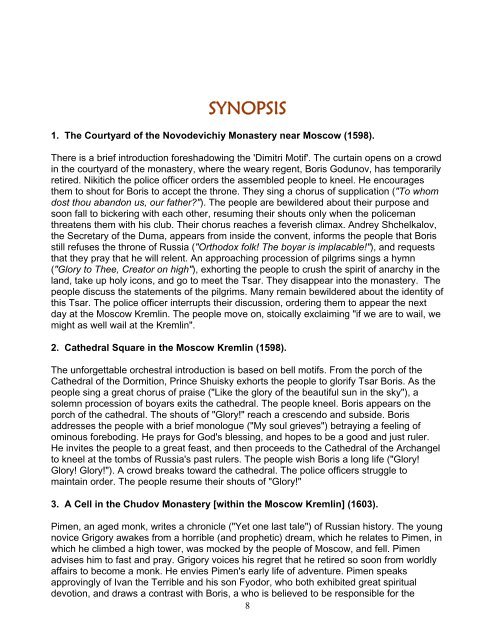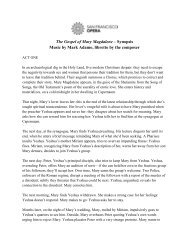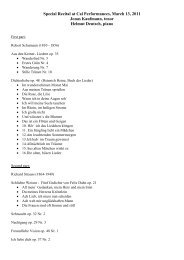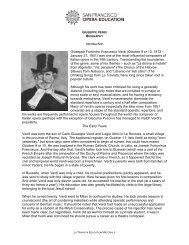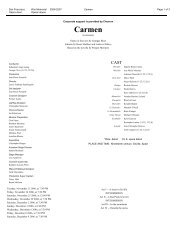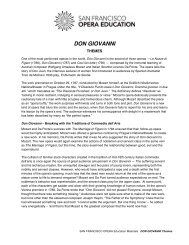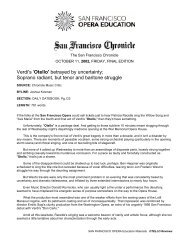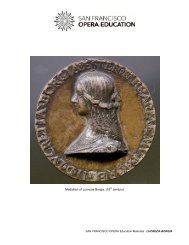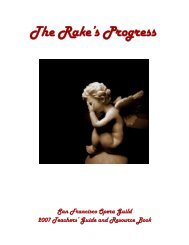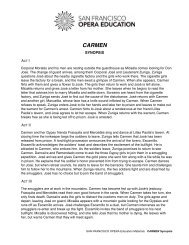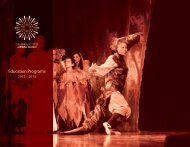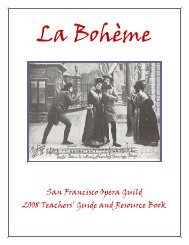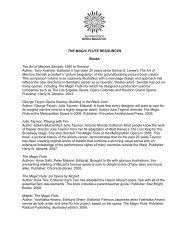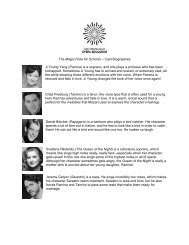Boris Godunov - San Francisco Opera
Boris Godunov - San Francisco Opera
Boris Godunov - San Francisco Opera
Create successful ePaper yourself
Turn your PDF publications into a flip-book with our unique Google optimized e-Paper software.
SYNOPSIS<br />
1. The Courtyard of the Novodevichiy Monastery near Moscow (1598).<br />
There is a brief introduction foreshadowing the 'Dimitri Motif'. The curtain opens on a crowd<br />
in the courtyard of the monastery, where the weary regent, <strong>Boris</strong> <strong>Godunov</strong>, has temporarily<br />
retired. Nikitich the police officer orders the assembled people to kneel. He encourages<br />
them to shout for <strong>Boris</strong> to accept the throne. They sing a chorus of supplication ("To whom<br />
dost thou abandon us, our father?"). The people are bewildered about their purpose and<br />
soon fall to bickering with each other, resuming their shouts only when the policeman<br />
threatens them with his club. Their chorus reaches a feverish climax. Andrey Shchelkalov,<br />
the Secretary of the Duma, appears from inside the convent, informs the people that <strong>Boris</strong><br />
still refuses the throne of Russia ("Orthodox folk! The boyar is implacable!"), and requests<br />
that they pray that he will relent. An approaching procession of pilgrims sings a hymn<br />
("Glory to Thee, Creator on high"), exhorting the people to crush the spirit of anarchy in the<br />
land, take up holy icons, and go to meet the Tsar. They disappear into the monastery. The<br />
people discuss the statements of the<br />
pilgrims. Many remain bewildered about the identity of<br />
this Tsar. The police officer interrupts their discussion, ordering them to appear the next<br />
day at the Moscow Kremlin. The people move on, stoically<br />
exclaiming "if we are to wail, we<br />
might as well wail at the Kremlin".<br />
2. Cathedral Square in the Moscow Kremlin (1598).<br />
The unforgettable orchestral introduction is based on bell motifs. From the porch of the<br />
Cathedral of the Dormition, Prince Shuisky exhorts the people to glorify Tsar <strong>Boris</strong>. As<br />
the<br />
people sing a great chorus of praise ("Like the glory of the beautiful sun in the sky"), a<br />
solemn procession of boyars exits the cathedral. The people kneel. <strong>Boris</strong> appears on the<br />
porch of the cathedral. The shouts of "Glory!" reach a crescendo and subside. <strong>Boris</strong><br />
addresses the people with a brief monologue ("My soul grieves") betraying a feeling of<br />
ominous foreboding. He prays for God's blessing, and hopes to be a good and just ruler.<br />
He invites the people to a great feast, and then proceeds to the Cathedral of the Archangel<br />
to kneel at the tombs of Russia's past rulers. The people wish <strong>Boris</strong> a long life ("Glory!<br />
Glory! Glory!"). A crowd breaks toward the cathedral. The police officers struggle<br />
to<br />
maintain order. The people resume their shouts of "Glory!"<br />
3. A Cell in the Chudov Monastery [within the Moscow Kremlin] (1603).<br />
Pimen, an aged monk, writes a chronicle ("Yet one last tale") of Russian history. The young<br />
novice Grigory awakes from a horrible (and prophetic) dream, which he relates to Pimen,<br />
in<br />
which he climbed a high tower, was mocked by the people of Moscow, and fell. Pimen<br />
advises him to fast and pray. Grigory voices his regret that he retired so soon from worldly<br />
affairs to become a monk. He envies Pimen's early life of adventure. Pimen speaks<br />
approvingly of Ivan the Terrible and his son Fyodor, who both exhibited great spiritual<br />
devotion, and draws a contrast with <strong>Boris</strong>, a who is believed to be responsible for the<br />
8


